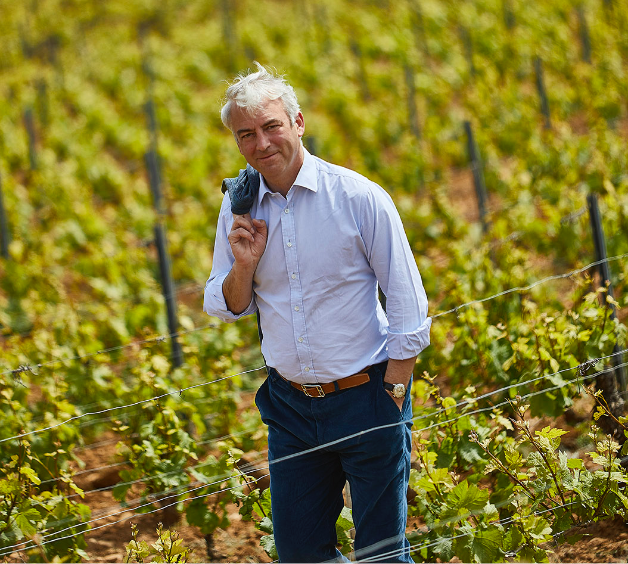Why it’s an organic and fine wine focus for Henriot
By Patrick SchmittIn an exclusive interview with the drinks business in London yesterday, president and CEO of Maisons & Domaines Henriot, Gilles de Larouzière, revealed how going organic and upmarket is future-proofing the group, which has holdings in Champagne, Burgundy and Oregon.

Gilles told db that he decided on a new direction for the family-owned business in 2020 built around three areas of emphasis that would be applied across all the estates, which are Bouchard Père et Fils in Burgundy, William Fèvre in Chablis, Beaux Frères in Oregon and Champagne Henriot.
This three-pronged strategy comprises a focus on “fine wine markets”, as well as the group’s estates, and a move to organic grape growing for every hectare owned by the company, with certification expected for its Burgundy properties by 2024 and Champagne vineyards by 2027.
While Beaux Frères is already a stage further than organic, being managed biodynamically, and William Fèvre is farmed organically – though not certified – Gilles is looking for organic certification across the group because he wants to show to his customers the group’s commitment to sustainable practices, despite the increase in costs they require right now.
So, while telling db that being organic increased vineyard management costs by 25-30% every year, he said that he was motivated to make the change for ethical and environmental reasons, as well as to preserve the group’s estate for future generations.
In terms of the greater expense of this move, he said that following an initial investment in “new tools” to be organic, he said the ongoing costs were higher due to the more labour-intensive nature of the farming philosophy – which eschews synthetic inputs – and greater variation in yields.
Indeed, referring to the greater risk of losing an entire crop when dedicated to organic methods, he said, “We need to be able to cope with a blank year every 10 years.”
As a result of this move to organics, when he achieves certification for the Burgundy landholding in 2024, Gilles will oversees the largest organic estate in the Côte d’Or, with 130 hectares (12 of which are grand cru and 74 premier cru), along with a further 78 hectares of prime land in Chablis. Added to this in 2027 will be 35ha in Champagne.
As for his decision to focus on Henriot’s family-owned estates, this has seen the group move to single out specific plots for Champagne – such as the just-launched L’Inattendue Chardonnay Grand Cru from Avize in 2016 – and, in Burgundy, to move away from its grape-buying business.
“We are reducing a lot the nègoce part of our business for Bouchard and William Fèvre and focusing much more on our estate,” he said, stressing the high proportion of top sites owned by the group, which is, for example, the largest owner of grand cru vineyards in Chablis.
Explaining further this decision, he said that having a large portfolio of wines from Burgundy spanning the whole region and all price points was proving a point of confusion for customers.
Partner Content
But, by focusing more on wines from Henriot’s own domaines, he said that it has helped the winemaking team in their work to craft great wines from great sites, while positioning the producer as stronger player in the competitive fine wine sector.
“We need to focus on where is our difference, what are our key assets, and that is not the nègoce business, but the vineyards we have, which are exceptional,” he said.
Continuing, he commented, “The race for volume is not something for us – we are already the smallest classical nègoce house in Burgundy, but we will become by volume really a tiny nègoce house.”
In terms of figures, Gilles said that when he arrived at the group in 2015, Bouchard was producing 3.5 million bottles, while today it amounts to 1.5-1.8m. “We have reduce our purchase [of grapes] by 60% in the past three years,” he recorded.
Consequently, he said that the business was more profitable. “Big volumes dilute our image, which is a pity with such an estate,” he said, adding, “And the business was not generating much value – so it was neither good for profit nor image.”
Further helping this repositioning is a change in focus when it comes to distribution, with a shift to what Gilles calls “fine wine markets”.
These comprise the US, Japan, UK, Italy and southeast Asia, and, in each case, the group is focused on gaining a presence among top merchants and restaurants in a bid to reach the fine wine consumer.
In turn, it’s with the wine lover and private collector in mind that Gilles is repositioning the business as a producer of fine, estate-driven, organically-certified wines, because that’s what the discerning drinker demands, and will pay a premium for.
Summing up on the overall strategic direction of Domaines Henriot today, he said, “It is a big change in the culture of the maison.”
Related news
WWE legend goes viral after Napa wine tasting
Favourite kosher wine 'impossible to find' due to trade war
Piccolo power: why Henkell's small bottle has stood the test of time




